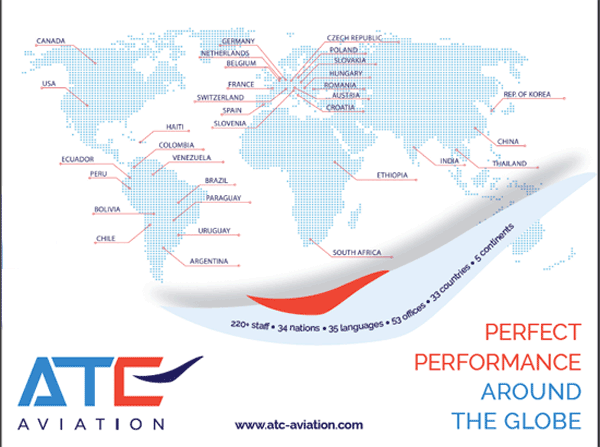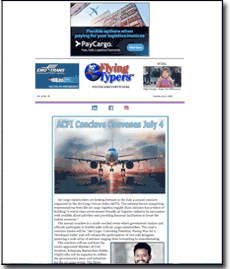
 |
 |
 #INTHEAIREVERYWHERE |
| Vol. 23 No. 32 | Thursday July 25, 2024 |
| |
 |
|
 |
A MATURE AIR CARGO COMMUNITY FOR THIS DAY AND AGE FT was recently in contact with TIACA’s DG Glyn Hughes. Speaking to Glyn is always interesting and informative. In this particular case we were looking at the recent statements surrounding IATA’s CASS. For the FlyingTypers Glyn released the following statement that could be both inspirational and instructive, as it clarifies some aspects that often remain on the side-line. These are Glyn’s comments, which we are delighted to report to our readers:   CASS,
launched in the late 1970s introduced a very efficient billing and settlement
system which saved all parties considerable time with the accounting process.
However, the industry that existed in the late 1970s is vastly different
from the one we see today. Many airlines were state owned, cargo agents
acted as carriers’ front office sales agents and the industry was
just finding its feet. CASS,
launched in the late 1970s introduced a very efficient billing and settlement
system which saved all parties considerable time with the accounting process.
However, the industry that existed in the late 1970s is vastly different
from the one we see today. Many airlines were state owned, cargo agents
acted as carriers’ front office sales agents and the industry was
just finding its feet.Air cargo in 2024 looks vastly different . . . and the question has to be asked, has CASS evolved as the world has changed? The technology has definitely been updated and now CASS is completely automated and paper free. It’s compliant with various tax and billing requirements around the world. However, a system which should sit behind the scenes supporting the business and commercial realities of airlines and their customers has unfortunately become front and centre and in some cases is actually interfering with the commercial activities of the industry. When launched, CASS was managed by local boards of airlines, and IATA was instructed how to manage the program. In the early 2000s changes occurred where much of the operation was centralized to benefit from technological developments and operational efficiencies, but the rules were still set by the airlines and implemented by cargo experts managing CASS. However, in the last five or so years IATA has now merged CASS and its passenger equivalent BSP operations into common service centres. Consequentially, the much larger BSP system is driving developments and CASS is being caught up in “must apply standards” methodology. BSP, which is a reporting system, has traditionally operated with a much higher risk factor and therefore financial securities are much more prevalent as travel agents are taking “forward sales”. CASS, which is a post service invoicing system has a much lower risk factor and traditionally did not have onerous financial security requirements. But that has now changed as IATA is applying a “protect everything” approach to satisfy internal KPIs and SOPs which now dictate how the systems are managed. And in some strange situations, forwarders are being provided with BSP rules saying you must comply with these. This has caused issues across a number of areas. GSSA often encounter difficulties joining as the cargo concept is unknown in BSP. CASS Associates, who are direct clients of the airlines, are now being treated just like accredited agents. Financial security requirements are escalating daily, and yet the system routinely over the past 45 years has collected over 99% of all monies billed, without needing to call upon financial securities. This is adding complexity and ironically inefficiency, as system leakage has increased. The industry is worth over USD 120 bn and yet only about a third is processed through CASS. Direct billings are taking place to avoid forwarders or associates having to pay for costly financial securities. CASS settlement terms are fixed by market, so there is no flexibility to accommodate bilateral agreements. And there is no flexibility for carriers and forwarders to personalize their payment or receivables interactions. And sadly, as has been reported elsewhere, any questions about the process or financial security calculations are almost impossible to address as you must upload queries into a customer portal and invariably get repeated answers that take you back to where you started. Such as why are daily sales calculated by taking the annual amount and dividing by 360? Why is the average risk not an average but a worst case calculation? CASS is managed according to high level Resolutions adopted by the cargo agency conference, however the proposals are drafted by IATA and the application of the rules by IATA is not subject to any oversight. FIATA and IATA for many years tried to get a new cargo program developed, but without success. This would have provided a new commercial relationship between carriers and their primary customers, the forwarders. CNS, a US-based IATA subsidiary, does operate a different, non-Resolution based program for freight forwarders and airlines in that market. CASS also operates differently and is more of a bill/pay system in that market.  What does the future hold for CASS and its
lucrative off shoot, Cargo IS? I sense a complete independent review and
operational structure aligned to the specific needs of the cargo market
is what is required. Some CASS associates / forwarders are talking about
raising this to competition authorities, but I hope it doesn’t get
to that.
What does the future hold for CASS and its
lucrative off shoot, Cargo IS? I sense a complete independent review and
operational structure aligned to the specific needs of the cargo market
is what is required. Some CASS associates / forwarders are talking about
raising this to competition authorities, but I hope it doesn’t get
to that.As expected, Glyn’s comments not only make perfect sense, but they also intimate a way forward that this industry probably needs. Thanks a million to Glyn and all our readers and contributors. Marco Sorgetti |
|
|
If
You Missed Any Of The Previous 3 Issues Of FlyingTypers Access complete issue by clicking on issue icon or Access specific articles by clicking on article title |
||
 Vol. 23 No. 29 From CLEAR VIEW You Can See Forever Chuckles For June 24, 2024 |
 Vol. 23 No. 30 ACFI Conclave Convenes July 4 Chuckles For July 2, 2024 ITA Airways Made In Italy A Unified Effort Dog Day's Summer Of 2024 |
 Vol.
23 No. 31 Vol.
23 No. 31Emirates SkyCargo New Positions Chuckles for July 15, 2024 Schiphol—Why Not The Best? Are You Having Any Fun? |
Publisher-Geoffrey Arend • Managing
Editor-Flossie Arend • Editor Emeritus-Richard Malkin |
Send comments and news to geoffrey@aircargonews.com
|